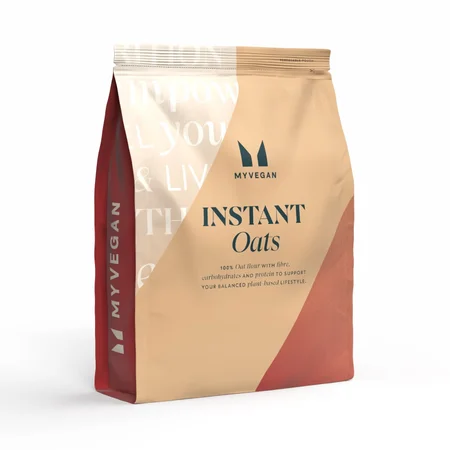What are Energy Supplements?
All of our energy supplements are a convenient source of high-quality carbohydrates — which are the most common source of energy for your body, and should make up between 55-75% of your dietary intake.
These carbohydrates come from a variety of different sources, for example, our 100% Instant Oats are just ultra-fine milled oats, perfect for making porridge, but we also have Vitafiber™ which is a high-fibre powder.
How to Use Energy Supplements
Our carb blends and powders can be used in a variety of different ways depending on your routine and lifestyle.
If you’re looking for a simple breakfast solution, we’ve got 100% Instant Oats and 100% Rolled Oats which are an easy way to start your day. You could use them to make porridge, overnight oats, or even get creative in the kitchen and make your own flapjacks and granola bars. We also do gluten-free oats if you’re intolerant to gluten.
For a quick boost of energy pre- or post-workout, one of our carbohydrate supplements like 100% Cyclic-Dextrin Carbs or 100% Dextrose Glucose Carbs are ideal to simply add to your usual protein shake or even just to water. Carbohydrates are known to assist muscle recovery after exercise — making these ideal to support your progress after a tough training session.1
FAQs
How do carbs provide energy for exercise?
They are metabolised to produce ATP, the energy "currency" of the body.
Which carbs are best for energy during exercise?
Easily digestible carbohydrates or simple sugars would be best as they provide an immediate source of energy for the body to use.
What's the best energy supplement for the gym?
This depends on practicality, however we'd recommend either the 100% High-Branched Cyclic Dextrin or 100% Maltodextrin powders. Both would provide easily digestible carbohydrates perfect for fueling your workouts!
What's the best energy supplement for running?
Due to the nature of running and how it can be disruptive to your gut, it may be best to use our energy gel elite products which provide an energy packed punch perfect for using during your run!
What's the best energy supplement for cycling?
As some bikes provide a holder for a water bottle, you can be quite flexible with your choice here. Our energy gel elite products are great for an energy packed, instant fuel punch. But you could use either our 100% Maltodextrin or 100% High Branched Cyclin-Dextrin powders to sip on throughout your cycle, it's really just personal preference!
When should I take an energy supplement?
That depends on the type of activity you are doing and if your diet permits; generally speaking, short duration, high-intensity activities, just prior may work best for most. Whereas for long duration, endurance focused activities it may be better to actually sip on or take an energy supplement just before and during.
How many energy supplements should I take?
That depends on how long you intend to train for. The maximal rate of single source carbohydrate usage is around 60g an hour, so that should be considered. For those doing longer duration, endurance-focused activities it may be several supplements. For those doing short duration, high intensity focused activities it may only be one energy supplement just prior to the activity.
1. Carbohydrates contribute to the recovery of normal muscle function (contraction) after highly intensive and/or long-lasting physical exercise leading to muscle fatigue and the depletion of glycogen stores in skeletal muscle. This beneficial effect is obtained with the consumption of carbohydrates, from all sources, at a total intake of 4g per kg body weight, at doses, within the first 4 hours, and no later than 6 hours, following highly intensive and/or long-lasting physical exercise leading to muscle fatigue and the depletion of glycogen stores in skeletal muscle.
